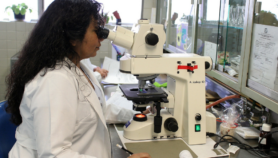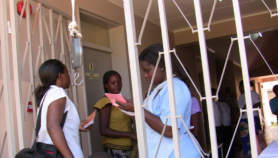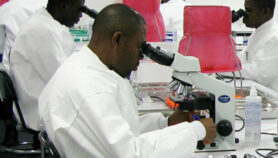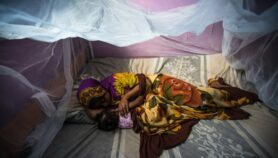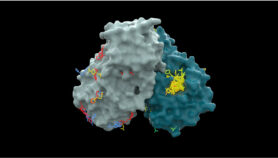Send to a friend
The details you provide on this page will not be used to send unsolicited email, and will not be sold to a 3rd party. See privacy policy.
Leaders of five African countries — Algeria, Egypt, Nigeria, Senegal, and South Africa — have put together the framework for a New Partnership for Africa’s Development (NEPAD). This initiative comes amid increasing concern that Africa lags behind the rest of the world in economic development because of political and social instability, coupled with low investments in science and technology. In his article, Steven Chandiwana, director of Zimbabwe’s Blair Research Institute, examines the vision and strategic framework of NEPAD for the redevelopment of Africa and suggests a role for local scientists in its implementation.
Most African countries obtained their independence from former colonial powers in the 1960s, ’70s, and ’80s; the last two to shed the colonial yoke were Namibia (in 1990) and South Africa (in 1994). However, optimal development for the African continent has been constrained by low foreign investments and by levels of public aid from developed countries that have remained below the targets set during the 1970s. Moreover, besides the low investments in human and capital resources, development aid and credit has frequently come with strings that are often illogical and inappropriate. This has led to the current debt deadlocks, which continue to hinder the growth of African countries.
By the turn of the new millennium, half the population of Africa, about 340 million people, still lived on less than US$1 per day. The mortality rate of children under 5 years of age is 140 per 1000, and life expectancy at birth is only 54 years. Only 58% of the population has access to safe water. The rate of illiteracy for people over 15 is 41%. There are only 18 mainline telephones per 1000 people in Africa, compared with 146 for the world as a whole and 567 for high-income countries.
And Africa continues to be plagued by civil wars, drought and desertification, political instability and the problem of refugees, deteriorating health infrastructures, and institutional decay. The situation has been exacerbated by the HIV/AIDS pandemic, mounting external debt, and a pervasive crisis of poverty among Africa’s people. As a result, Africa continues to be marginalised in the globalisation process.
The New Partnership for Africa’s Development (NEPAD) calls for the reversal of this abnormal situation by changing the relationships that prop it up. However, NEPAD is not intended to become a vehicle to further entrench dependency through foreign aid or marginal concessions on existing obligations. Proponents of NEPAD believe that it presents an historic opportunity to end Africa’s scourge of underdevelopment. This optimism is based on the fact that the resources that are required to launch a global war on poverty and underdevelopment, including capital, technology, and human skills, exist in abundance in Africa and are within reach through a new global partnership based on shared responsibility and mutual interest. What is required is to mobilise these resources and apply them properly through a bold and imaginative leadership that is genuinely committed to sustained human development and poverty eradication.
Through NEPAD, African leaders plan to give the continent a determined voice in its own destiny while simultaneously welcoming constructive engagement with developed countries. Recent developments in conflict resolution in the Democratic Republic of the Congo and Burundi indicate that progress and hope can be reality. Indeed, democratic governments that are committed to the protection of human rights and people-centred development are on the increase. Africans have begun to demonstrate their refusal to accept poor economic and political leadership. NEPAD would like to consolidate and accelerate these gains in spite of their current unevenness and inadequacy.
However, in fostering a new relationship of partnership between Africa and the international community, especially the highly industrialised countries, we will all need to work to overcome the mistrust borne out of the colonial era and to ensure that the development chasm that has widened over centuries of unequal relations is closed.
The Role of Scientists
NEPAD-led sustainable development in Africa should reduce replication of foreign technologies and invest in social capital–its scientists–and its R&D institutions. This is an imperative if NEPAD is to redress inequalities in North-South relations and replace the existing contradictions in S&T partnerships, which are based on a superior/inferior model, with structures based on mutual responsibilities and respect. One way to reach this goal is to create information bridges that facilitate access to needed information and maximise indigenous cultural systems of technology and production (see, e.g., Next Wave’s article “Shared Scientific Knowledge”).
| A Place for Scientists? Two key questions in defining the role of scientists in NEPAD are: 1. The extent to which NEPAD’s policies, organisation, and implementation strategies that are based on models from developed countries and those in Asia will transfer to Africa. 2. Whether Africa has a sufficiently broad and deep scientific base to develop its own economic development and knowledge management paradigms through insights generated by its own research efforts. |
The Next Generation of Scientists
In the resource-poor environment typical in most African countries, teamwork is essential to manage and organise research in an efficient manner and to minimise unnecessary bottlenecks. Research leadership is crucial to develop young scientists and ensure effective implementation of research, training, technology transfer, and capacity-building projects. This requires maintaining good relationships with overseas research establishments to facilitate exchange of information and researchers and to mobilise international research funds. Senior and experienced scientists are a premium in African institutions due to the brain drain to developed countries. NEPAD should develop a continent-wide policy to support such scientists and ensure that they are remunerated on the basis of their productivity. Expected outputs from such scientists might include increased quantity and quality of scientific publications, seminars, technical reports, and policy briefs, as well as mentoring of young scientists through PhD-level training.
Researchers should keep open communication with policy-makers and with programme and community leaders to discuss areas for research if the end product is to be of maximum benefit to the local population. Research should influence decisions at operational and district levels. Indeed, cabinet-level decisions should be based on research findings. In this context, policy- and decision-makers should be consulted on the research questions if they are to see these as a viable means for decision-making.
Challenges for the Future
The organisation of research in Africa should be seen from a global perspective, and the continent should present a clear case that investments in research reduce inequities in opportunities and resources. Health research requirements to support the public health sector in Africa are on the order of US$5 billion (a conservative estimate), but a fraction of this amount is available.
Through NEPAD scientists should influence the international research agenda by identifying their needs and constraints and by proposing solutions to their problems. Research in Africa is fragmented and the actual status of research remains unclear, while national institutions are struggling to build critical capacities, develop organisational mechanisms, and formulate priorities. NEPAD should facilitate the building of networks of research groups that share expertise and facilities through collaboration with international groups that can increase the flow of resources into the continent. NEPAD can facilitate this process by ensuring a congenial research environment, free of unnecessary bureaucracy, and provide a career structure that promotes the development of critical numbers in any scientific field.
Pareto’s Law
For African scientists, an interesting principle — the so-called Pareto’s Law — is to concentrate on areas of comparative advantage for unbalanced positive growth. By specializing on traditional health and agricultural systems in which we have great comparative advantage, we can achieve the most rapid growth in improving economic development and health status in the short run. Pareto’s Law gives government policy-makers and commercial companies interested in marketing of crop products the opportunity to evaluate where they should spend time, money, and energies in future. Consideration should be given to channelling efforts into those areas which will yield the greatest returns.
A priority area for S&T is the agricultural sector because of the periodic droughts and food insecurity that continue to plague many African countries. Properly targeted S&T activities should lead to a fairly competitive and productive agricultural sector. The fruits of research and development can then be utilised effectively by the agricultural industry, making it the mainstay of the economy both in volume and value terms.
There must also be a well-developed health and industrial sector, which can capitalise on and exploit the benefits of research and lead to a critical pool of skilled managers and professionals in the private and public sectors. In the first instance production of medicines and vaccines would seem to be the best option for expansion in the medical field and later for industry to become involved in the processing of traditional medicines and indigenous cultural systems in collaboration with local scientists.
Conclusions
NEPAD and scientific endeavour are closely intertwined. Local discoveries and their exploitation on behalf of the society cannot proceed without the dedication of local scientists. To maximise productivity in S&T development, we will need to establish national systems of innovation that incorporate highly motivated scientists, adequately funded and functioning S&T institutions, and organisations and policies that will blend together in a constructive fashion with the aim of meeting common social and economic goals. Scientists and research councils should cooperate and develop S&T databases and link these with existing ones to minimise duplication and facilitate their use.
NEPAD should provide a platform for research institutions as they create Web pages and electronic information technology to highlight their core competencies, technical capability, and manpower base to facilitate linkages with other research institutions and as a window for potential profitable transfer of intellectual property to industry. S&T should be popularised among the public, industry, scientific community, and policy-makers through roundtable discussions, open days, seminars, science fairs, competitions, television and radio programmes especially aimed at the youth, and through syndicated newspaper columns.
Finally, the discovery of new and innovative material to help with economic development is based on an active, motivated scientific community that is committed to the gaols of NEPAD. However, Africa has been losing trained scientific personnel to the more developed nations–primarily because they are seeking opportunities to pursue their research in a sophisticated environment as well as to obtain better remuneration. In spite of this, Africa has scientists with the skills to forge local and international partnerships. But the continent’s capacity to implement effective health interventions depends on its ability to retain those scientists and on the willingness of planners and programme managers to use local research findings.
Through NEPAD, Africa needs to redesign its own self-image and to invent a new science-led and African culture-informed future. NEPAD calls for the creation of an enabling environment for social peace and intra-Africa stability as a first step in having a stake in world peace and prosperity.
ACKNOWLEDGEMENTS
I would like to acknowledge the input from colleagues at the Blair Research Institute, the Biomedical Research and Training Institute, the Human Sciences Research Council, and from collaborating agencies that gave views on the contents of the article.
Reprinted with permission from Chandiwana, S. (2002) NEPAD: Vision for Africa, Next Wave: http://nextwave.sciencemag.org/cgi/content/full/2002/11/07/6. Copyright 2002 American Association for the Advancement of Science.
http://nextwave.org







